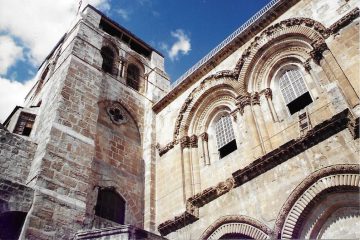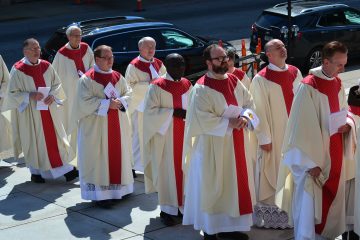Sunday Scripture: The meaning of ‘God’s house’
March 9, 2012
By Father Timothy P. Schehr
Third Sunday of Lent: Exodus 20:1-17; 1 Corinthians 1:22-25; John 2:13-25
At Passover God’s people recalled all the wonderful events associated with their deliverance from Egypt. But when Jesus arrives at the temple on this first Passover of His public ministry, He cannot ignore what He sees.
The disciples must have looked on in amazement as they saw the Lord plying cords together for a whip then driving sheep and oxen out of the temple area. We can imagine all the commotion as He turned over tables and scattered coins. There were cages with doves in the area too. Jesus was more gentle with them, only instructing their keepers to take them away. Jesus is not out of control with rage, but acting with purpose. That purpose comes to light when Jesus finally speaks and announces He does not want to see his Father’s house transformed into a marketplace. The great prophets of the Old Testament would have understood what Jesus was saying. The Book of Isaiah begins with God upbraiding the people for insincere worship. God even describes them as trampling about in the court of the temple. Jeremiah said pretty much the same thing as He stood right inside the temple (Jeremiah 7). And Ezekiel saw God’s glory abandon the temple altogether because of the idolatry in the hearts of the people who worshiped there (Ezekial 11). It seems Jesus is right in step with these great prophets when He halts the sacrificial rituals that day and challenges the people to practice more sincere worship of His heavenly Father.
The disciples recall a verse from Psalm 69 about being consumed with zeal for God’s house. They do not yet fully realize it, but in the actions of Jesus they are witnessing right before their eyes the fulfillment of so many prophetic passages from the Scriptures.
The rest of the reading reveals a deeper meaning to the phrase “God’s house.” Understandably some Jewish bystanders want to know what gives Jesus the right to do what He just did. This provides Jesus the opportunity to speak about the purpose of His coming to earth. The world will presume to have finished him by putting Him to death, but on the third day He will rise from the dead. In John’s Gospel, this is the hour when Jesus wins the victory over sin and death and thus opens the way to eternal life for God’s faithful people.
In the Gospel reading however, Jesus puts all of this another way: they can destroy this temple but He will raise it up in three days. Of course, people misunderstand His meaning and presume He speaks about the Jerusalem temple Herod had been renovating for decades. But as John reminds his readers Jesus speaks about the temple of His body. John will include two more Passovers in his Gospel and they, too, will accent the body of the Lord, first as the bread of life (John 6) and then as the sacrificial Lamb of God (John 18-21).
The Exodus reading complements this Gospel. The first three of the Ten Commandments call God’s people to worship God alone, respect the divine name and observe the Sabbath. This is the kind of sincere religion Jesus was calling for by cleansing the temple.
In his Letter to Corinth Paul celebrates the power of God displayed by the cross of Jesus. His death was not foolishness or weakness. It displayed the wisdom and strength of God to win salvation for the world.
Father Schehr is a faculty member at the Athenaeum of Ohio.













